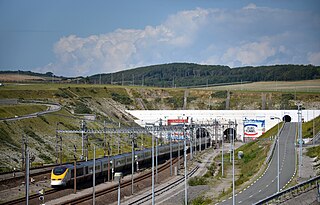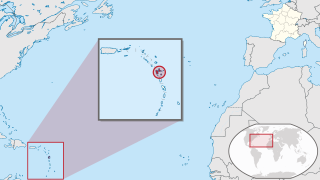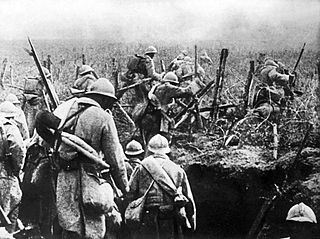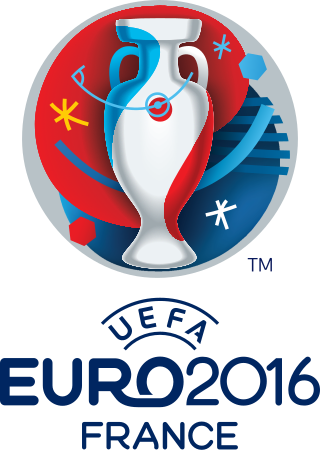| ||||||||||||||||
| ||||||||||||||||
| ||||||||||||||||
Legislative elections were held in France on 9 July 1842. Only citizens paying taxes were eligible to vote.
| ||||||||||||||||
| ||||||||||||||||
| ||||||||||||||||
Legislative elections were held in France on 9 July 1842. Only citizens paying taxes were eligible to vote.
 | ||||
|---|---|---|---|---|
| Party | Votes | % | Seats | |
| Resistance Party | 266 | |||
| Opposition | 193 | |||
| Total | 459 | |||
| Total votes | 173,694 | – | ||
| Registered voters/turnout | 220,040 | 78.94 | ||
| Source: Nohlen & Stöver, Rois et Presidents | ||||
Louis-Philippe of France dissolved the legislature on 16 July 1846. [1]

The Channel Tunnel, sometimes referred to by the portmanteau Chunnel, is a 50.46 km (31.35-mile) undersea railway tunnel, opened in 1994, that connects Folkestone with Coquelles beneath the English Channel at the Strait of Dover. It is the only fixed link between the island of Great Britain and the European mainland.

The French Revolution was a period of political and societal change in France that began with the Estates General of 1789, and ended with the coup of 18 Brumaire in November 1799 and the formation of the French Consulate. Many of its ideas are considered fundamental principles of liberal democracy, while its values and institutions remain central to modern French political discourse.

Guadeloupe is an overseas department and region of France in the Caribbean. It consists of six inhabited islands—Basse-Terre, Grande-Terre, Marie-Galante, La Désirade, and two Îles des Saintes—as well as many uninhabited islands and outcroppings. It is south of Antigua and Barbuda and Montserrat and north of Dominica. The capital city is Basse-Terre, on the southern west coast of Basse-Terre Island; the most populous city is Les Abymes and the main centre of business is neighbouring Pointe-à-Pitre, both on Grande-Terre Island. It had a population of 395,726 in 2024.

Haiti, officially the Republic of Haiti, is a country on the island of Hispaniola in the Caribbean Sea, east of Cuba and Jamaica, and south of The Bahamas. It occupies the western three-eighths of the island, which it shares with the Dominican Republic. Haiti is the third largest country in the Caribbean, and with an estimated population of 11.4 million, is the most populous Caribbean country. The capital and largest city is Port-au-Prince.

Mauritius, officially the Republic of Mauritius, is an island country in the Indian Ocean, about 2,000 kilometres off the southeastern coast of East Africa, east of Madagascar. It includes the main island, as well as Rodrigues, Agaléga, and St. Brandon. The islands of Mauritius and Rodrigues, along with nearby Réunion, are part of the Mascarene Islands. The main island of Mauritius, where the population is concentrated, hosts the capital and largest city, Port Louis. The country spans 2,040 square kilometres (790 sq mi) and has an exclusive economic zone covering 2,300,000 square kilometres.

Monaco, officially the Principality of Monaco, is a sovereign city-state and microstate on the French Riviera a few kilometres west of the Italian region of Liguria, in Western Europe, on the Mediterranean Sea. It is a semi-enclave bordered by France to the north, east and west. The principality is home to nearly 39,000 residents as of the 2020s, of whom about 9,500 are Monégasque nationals. It is recognised as one of the wealthiest and most expensive places in the world. The official language of Monaco is French. Monégasque, English and Italian are also spoken and understood by many residents.

Paris is the capital and largest city of France. With an estimated population of 2,102,650 residents in January 2023 in an area of more than 105 km2 (41 sq mi), Paris is the fourth-most populous city in the European Union, the ninth-most populous city in Europe and the 30th most densely populated city in the world in 2022. Since the 17th century, Paris has been one of the world's major centres of finance, diplomacy, commerce, culture, fashion, and gastronomy. Because of its leading role in the arts and sciences and its early adaptation of extensive street lighting, it became known as the City of Light in the 19th century.

Saint Pierre and Miquelon, is a self-governing territorial overseas collectivity of France in the northwestern Atlantic Ocean, located near the Canadian province of Newfoundland and Labrador. An archipelago of eight islands, St. Pierre and Miquelon is a vestige of the once-vast territory of New France. Its residents are French citizens. The collectivity elects its own deputy to the National Assembly and participates in senatorial and presidential elections. It covers 242 km2 (93 sq mi) of land and had a population of 5,819 as of the January 2022 census.

The Statue of Liberty is a colossal neoclassical sculpture on Liberty Island in New York Harbor, within New York City. The copper-clad statue, a gift to the United States from the people of France, was designed by French sculptor Frédéric Auguste Bartholdi and its metal framework was built by Gustave Eiffel. The statue was dedicated on October 28, 1886.

The Battle of the Somme, also known as the Somme offensive, was a major battle of the First World War fought by the armies of the British Empire and the French Third Republic against the German Empire. It took place between 1 July and 18 November 1916 on both sides of the upper reaches of the river Somme in France. The battle was intended to hasten a victory for the Allies. More than three million men fought in the battle, of whom more than one million were either wounded or killed, making it one of the deadliest battles in all of human history.

Napoleon Bonaparte, later known by his regnal name Napoleon I, was a French military officer and statesman who rose to prominence during the French Revolution and led a series of successful campaigns across Europe during the French Revolutionary and Napoleonic Wars from 1796 to 1815. He was the leader of the French Republic as First Consul from 1799 to 1804, then of the French Empire as Emperor of the French from 1804 to 1814, and briefly again in 1815.

The 1998 FIFA World Cup was the 16th FIFA World Cup, the football world championship for men's national teams. The finals tournament was held in France from 10 June to 12 July 1998. The country was chosen as the host nation by FIFA for the second time in the history of the tournament, defeating Morocco in the bidding process. It was the ninth time that it was held in Europe. Spanning 32 days, it was the longest World Cup tournament ever held.

The France national football team represents France in men's international football. It is controlled by the French Football Federation, the governing body for football in France. It is a member of UEFA in Europe and FIFA in global competitions. The team's colours and imagery reference two national symbols: the French blue-white-red tricolour and Gallic rooster. The team is colloquially known as Les Bleus. They play home matches at the Stade de France in Saint-Denis and train at Centre National du Football in Clairefontaine-en-Yvelines.

Paris Saint-Germain Football Club, commonly referred to as Paris Saint-Germain or simply PSG, is a professional football club based in Paris, France. They compete in Ligue 1, the top division of French football.

World War I or the First World War, also known as the Great War, was a global conflict between two coalitions: the Allies and the Central Powers. Fighting took place mainly in Europe and the Middle East, as well as in parts of Africa and the Asia-Pacific, and in Europe was characterised by trench warfare; the widespread use of artillery, machine guns, and chemical weapons (gas); and the introductions of tanks and aircraft. World War I was one of the deadliest conflicts in history, resulting in an estimated 10 million military dead and more than 20 million wounded, plus some 10 million civilian dead from causes including genocide. The movement of large numbers of people was a major factor in the deadly Spanish flu pandemic.

France, officially the French Republic, is a country located primarily in Western Europe. Its overseas regions and territories include French Guiana in South America, Saint Pierre and Miquelon in the North Atlantic, the French West Indies, and many islands in Oceania and the Indian Ocean, giving it one of the largest discontiguous exclusive economic zones in the world. Metropolitan France shares borders with Belgium and Luxembourg to the north, Germany to the northeast, Switzerland to the east, Italy and Monaco to the southeast, Andorra and Spain to the south, and a maritime border with the United Kingdom to the northwest. Its metropolitan area extends from the Rhine to the Atlantic Ocean and from the Mediterranean Sea to the English Channel and the North Sea. Its eighteen integral regions—five of which are overseas—span a combined area of 643,801 km2 (248,573 sq mi) and have a total population of nearly 68.4 million as of January 2024. France is a semi-presidential republic with its capital in Paris, the country's largest city and main cultural and economic centre.

The 2016 UEFA European Football Championship, commonly referred to as UEFA Euro 2016 or simply Euro 2016, was the 15th UEFA European Championship, the quadrennial international men's football championship of Europe organised by UEFA. It was held in France from 10 June to 10 July 2016. Spain were the two-time defending champions, having won the 2008 and 2012 tournaments, but were eliminated in the round of 16 by Italy, Portugal won the tournament for the first time, following a 1–0 victory after extra time over the host team, France, in the final played at the Stade de France.

The 2024 Summer Olympics, officially the Games of the XXXIII Olympiad and branded as Paris 2024, were an international multi-sport event held from 26 July to 11 August 2024 in France, with several events started from 24 July. Paris was the host city, with events held in 16 additional cities spread across metropolitan France, including the sailing centre in the second-largest city of France, Marseille, on the Mediterranean Sea, as well as one subsite for surfing in Tahiti, French Polynesia.

Vichy France, officially the French State, was a French rump state headed by Marshal Philippe Pétain during World War II, established after the French capitulation after the defeat against Germany. It was named after its seat of government, the city of Vichy. Officially independent, but with half of its territory occupied under the harsh terms of the 1940 armistice with Nazi Germany, it adopted a policy of collaboration. Though Paris was nominally its capital, the government established itself in the resort town of Vichy in the unoccupied "free zone", where it remained responsible for the civil administration of France as well as its colonies. The occupation of France by Germany at first affected only the northern and western portions of the country. In November 1942, the Allies occupied the French North Africa, and in response the Germans and Italians occupied the entire Metropolitan France, ending any pretence of independence by the Vichy government.

Emmanuel Jean-Michel Frédéric Macron is a French politician who has served as President of France since 2017. He previously was Minister of Economics, Industry and Digital Affairs under President François Hollande from 2014 to 2016 and deputy secretary-general to the president from 2012 to 2014. He has been a member of Renaissance since he founded it in 2016.